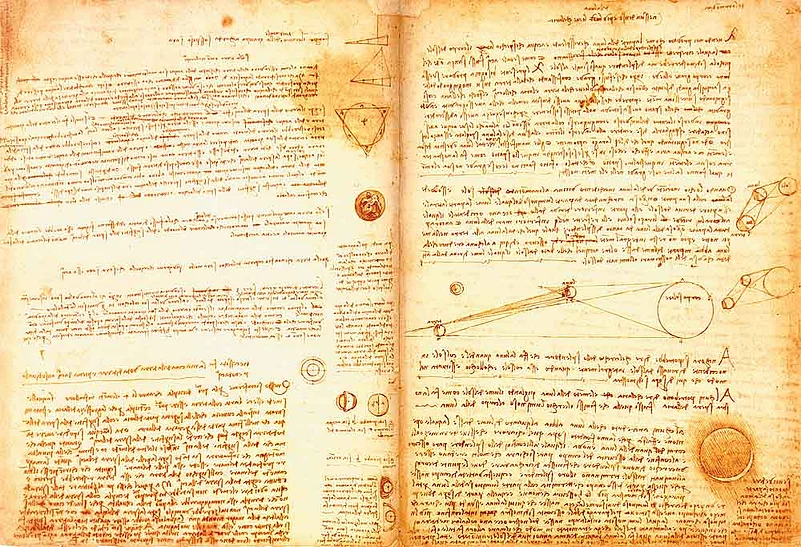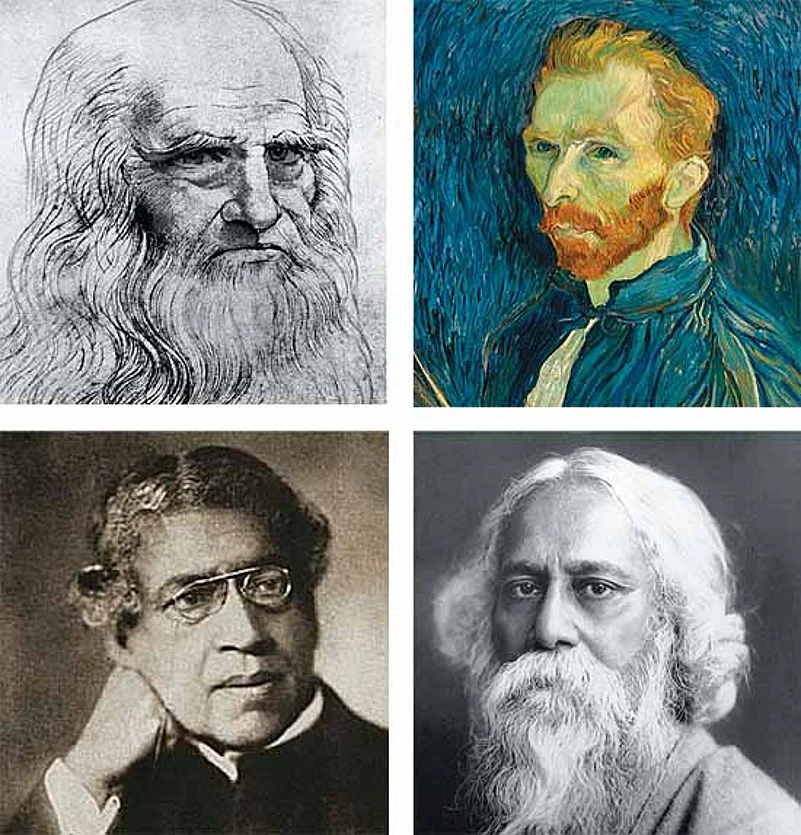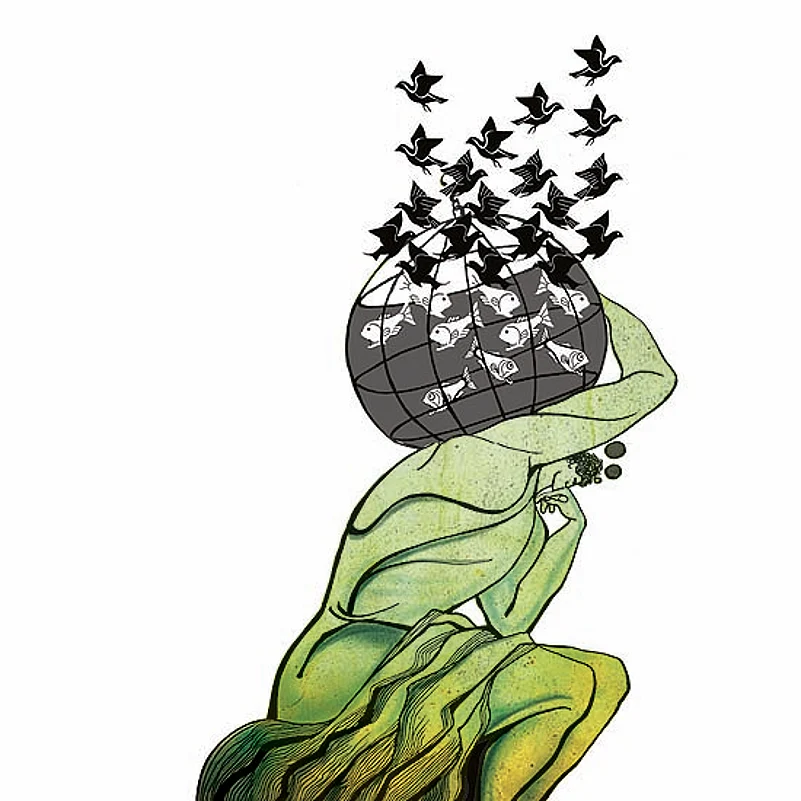In 1994, Bill Gates, surely one of the smartest men on the planet, spent $30.8 million to acquire what was essentially a loose sheaf of papers scrawled densely all over in mirror image writing—a haphazard mixture of stray thoughts, speculations, observations and theories on topics ranging from astronomy, the nature of light, why fossils are sometimes found on tops of mountains, and why the moon shines at night. These 18 pages, each folded in half and written on both sides—formed a 72-page document which Gates has said he turns to often for inspiration. They form the Codex Leicester (named after the Earl of Leicester, one-time owner of the papers), an idea diary maintained by Leonardo da Vinci, one of the smartest men who ever lived.
The 500-year journey of the Codex Leicester from Da Vinci to Gates is also somehow emblematic of the sheer width of what we consider and acknowledge as ‘smart’. Da Vinci was the ultimate polymath: painter, sculptor, architect, musician, mathematician, engineer, inventor, anatomist, geologist, cartographer, botanist, writer—a man whose curiosity and imagination seemed to be truly boundless. Gates, on the other hand, has invented nothing; his company Microsoft has always been behind the curve with every new software application, from word processors and spreadsheets to the internet browser. In fact, even his first foray into business—a move that would in time make Microsoft the most powerful software company in the world for two decades—was based on an operating system that he bought cheap, reworked slightly and licensed to computer behemoth IBM (I am talking about MS-DOS, the programme at the heart of almost every PC even today). But with every novel development in the software applications area, Gates would come from behind, produce a competing product, often clunkier and less user-friendly than the original, and use a combination of razor-sharp business intelligence and the hammer-of-Thor blunt instrument of Microsoft’s market muscle to become the category leader, and in most cases, run the pioneer out of business. One could think of Da Vinci’s mirror writing as a symbol of how completely opposite—but equally potent—Gates’ spectacular intelligence is to the Renaissance man’s.
What is ‘smart’? It is certainly different from ‘clever’, and ‘brainy’ instantly evokes associations with academic brilliance. The closest equivalent is ‘intelligent’, except for one little factor: the word ‘smart’ (even when uttered in his inimitable way by the late lamented actor Ajit) carries a hint of appreciation and admiration, more than ‘intelligent’ does. Intelligent is more neutral; smart is figuring out that if fossils are found on mountains, then mountains must have formed the sea bed millions of years ago. Smart is getting blindsided by Netscape Navigator and then giving away Internet Explorer free with Windows. When an intelligent person speaks, you certainly take note of what he or she is saying. When a smart person says something, you pay close attention and hope to learn something.
For the purposes of this essay, I am keeping extraordinarily gifted people of a certain type out of the ‘smart’ category: prodigies who have memorised the Rig Veda by the age of eight, or can tell what the 1,35,678th prime number is within 30 seconds. We are concerned here with what scientists call ‘cognitive plasticity’, the ability of a person to comprehend the world around him or her, be open and receptive to new developments, have the mental flexibility to quickly and effectively adapt to them, and then be able to take things forward or in new directions.

Da Vinci’s prized thoughts Gates’ $31 million-dollar Codex Leicester papers
The concept of Intelligence Quotient or IQ has now been packed up and stored away in the attics of science. From the work of Harvard psychologist Howard Gardner, we now know that there are nine types of intelligence: from naturalist intelligence (nature-smart; what a good farmer or a chef would have in abundance) and logical-mathematical intelligence (number/reasoning-smart; essential to be a fine mathematician or detective), to interpersonal intelligence (people-smart; teachers, actors, politicians) and spatial intelligence (roughly, picture-smart; sailors, pilots, painters, sculptors, architects). So if a Nobel laureate in Physics can’t figure out what the fuss is all about when viewing Picasso’s Les Demoiselles d’Avignon, it doesn’t make him less smart. Picasso would probably have been as blind to the beauty that the Avignon-sceptical scientist sees in the equations of quantum mechanics.
Of course, what makes people smart has been an area of intense research ever since the humanoid who first figured out that opposable thumbs were a good thing. Nature, nurture etc—we’ll never hear the end of it. In the meantime, other angles have also been explored and some interesting conclusions reached. Several British studies have shown that intelligent children are more likely to be heavy drinkers and prone to drug abuse when they grow up (Caveat: the reverse is not true. Drunkards and dopers are not necessarily intelligent people). For what it’s worth, scientists have found a strong correlation between a country’s per capita consumption of chocolate and the number of Nobel laureates it has produced. And the most bizarre of all: American psychiatrist Aikarakudy Alias (that’s his name, I swear) spent decades studying the link between body hair and intelligence, and proved that intelligent men are likely to be hairier than their less fortunate counterparts. Perhaps out of pity for the cosmetics industry, Alias did not carry out similar tests on women. Imagine the billions of dollars of revenue evaporating—the terrible rack and ruin and societal confusion—if studies showed the same results for women and were widely publicised by leftist-feminist NGOs!
Which, of course, brings us to that common capitalist question: “If you’re so smart, why aren’t you rich?” There is something abhorrent about this query. Of course, Mukesh Ambani is super-smart, but so was Jagadish Chandra Bose, who invented wireless communication at least a couple of years before Guglielmo Marconi, who received the Nobel prize for the breakthrough (It is now established that Marconi met Bose in London when the Indian scientist was demonstrating his wireless devices there, and changed his research methods after that meeting). Bose also invented microwave transmission and the whole field of solid state physics, which forms the basis of micro-electronics. Bose’s contributions are all around us today, from almost every electronic device we have at home to the most powerful radio telescopes in the world. But he steadfastly refused to patent any of his inventions, or to license them to any specific company. Some 70 years after Bose’s death, the global apex body, Institute of Electrical and Electronics Engineers, officially acknowledged Bose to be the father of wireless communication.
In fact, that smug question about smart and rich is actually a stupid one. There is no natural correlation at all between smartness and wealth, or even career success. I doubt whether any great poet ever made much money. Van Gogh sold only one painting in his entire lifetime. How many great Indian authors are rolling—or ever rolled—in the dough? Instead, all of us can possibly name at least one truly talented writer/creator in our mother tongue who died in penury or committed lengthy frustrated alcoholic suicides. Ritwik Ghatak instantly comes to mind.
Smartness and academic success? Of course, we have the Amartya Sens and the V.S. Ramachandrans, but one can draw no definite conclusions. Not by a long shot. Tagore couldn’t stand school and had less than a year of formal education. I have met some extremely successful and super-smart people (I would not like to name them to protect their privacy) whose academic records are abysmal. Many of the most innovative and creative entrepreneurs in the internet space—both in India and abroad—are college dropouts. And Akbar, one of the greatest of Indian emperors, was completely illiterate.

I have had the good fortune to come into contact with many super-smart people in my life, during my student days at IIT and IIM, and then as a journalist and while researching a book on IITians. IITians are generally assumed to be bright guys (I use the word ‘guys’ not out of any gender bias, but only because in the IITs, male students far outnumber females), which they, generally, are. But even among them, some stand out for the quality of their minds—the sheer quickness and sharpness and the ability to absorb new ideas. Many of these extraordinary people, however, are not among the top rankers in the entrance examination, nor do they thereafter get the highest grades in their IIT class. In fact, I once heard Goa CM Manohar Parrikar (himself an IITian of middling grades, but a very smart man by any standards) say that in his experience, the IITians who are the smartest and do most well in life, whatever the career they chose, are the ones who were middle of the class. They were too lazy and/or sceptical to work hard enough to break through to the top, but were clever enough to make sure they were not at the bottom of the heap. I wouldn’t know, but the same could perhaps hold true for IIMs too.
And there’s one question that can’t be brushed under the carpet. Are smart people happier people? “Happiness in intelligent people is the rarest thing I know,” wrote Ernest Hemingway famously, and he was a super-smart man who did more to change the style of English prose than any other 20th century writer. He committed suicide. One should be wary of generalisations, especially in the case of super-bright people, who, by definition, are at the edge of any societal normal distribution curve. One should also remember that clinching evidence of high intelligence is often—though certainly not in all cases—discomfort with the status quo, a refusal to accept conventional wisdom and handed-down norms, mores and codes of conduct, both in terms of their work and their ‘morality’. Most importantly, the truly intelligent mind is a questioning mind. And as any autocrat in any field knows instinctively, too many questions are not a good thing. The number of clear answers available in life is less than the number of urgent questions one can ask.
Whether there is a God—either actively autocratic or Someone who couldn’t be less bothered—or the universe is just a construct of chance and randomness, smart guys, it stands to reason (now there’s another chameleonic concept, reason, but let that be), would ask the toughest questions. (By the way, all relevant research shows a strong correlation between atheism and high intelligence, and atheism is fundamentally about asking the biggest and knottiest questions of all, and then answering them to one’s own satisfaction). So super-brightness often comes with a receipt for stuff stored in some left-luggage facility at the back of the mind. It is now up to the individual whether to use the receipt and take a look at that baggage. Which will invariably be crammed with questions.
An art historian once told me Da Vinci spent the last years of his life sketching and studying water. It was a challenge that nearly turned into an obsession. How do you get a firm grip on the ever-changing state of a lake or a river on paper or canvas? After all, every time you put your foot in a river, it’s a different river. Every ripple changes the lake. The greatest creative genius in recorded history was fascinated and wouldn’t give up. Some of his musings on the flow and nature of water are in Gates’ prized Codex Leicester.
In Greek mythology, Rhea was the mother of all the Olympian gods and goddesses. She is the goddess of flow. Obviously, the Greeks, who created a really smart civilisation, recognised something very basic about the ways of the universe—the constant impermanence and complex cause-and-effect linkages in service of some unfathomable grand pattern. Truly smart people are compelled to either move against the flow, or try to master the flow and direct it towards where they will it. That is their hallmark, the destiny they choose for themselves.
(Sandipan Deb is the author of The Last War.)























